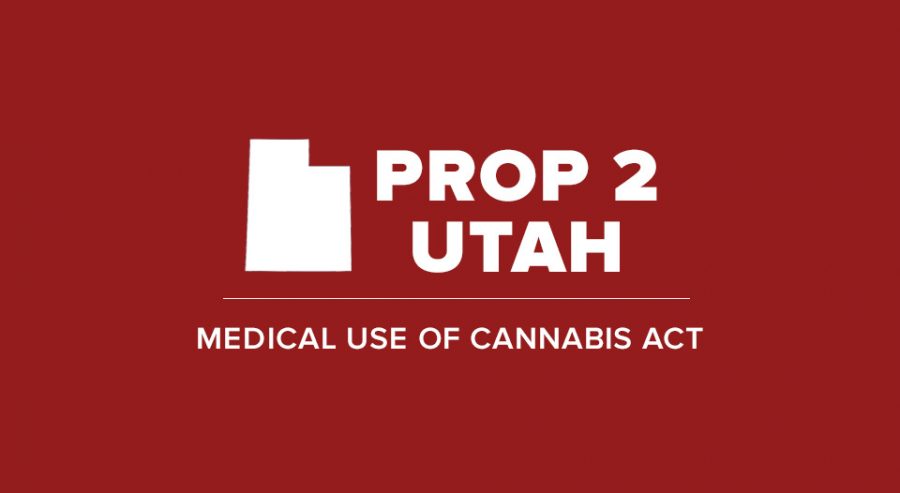Proposition Two: The medical THC debate
Proposition 2’s goal is to legalize medical marijuana for those with qualifying conditions. People can receive a card with a recommendation from a physician. Under the measure, a medical marijuana cardholder could not smoke marijuana or use a device to facilitate the smoking of marijuana. During any one 14-day period, an individual would be allowed to buy either 2 ounces of unprocessed marijuana or an amount of marijuana product with no more than 10 grams of tetrahydrocannabinol (THC) or cannabidiol. After January 1, 2021, individuals with medical cards would be allowed to grow six marijuana plants for personal use within their homes if there are no dispensaries within 100 miles of their residence.
Utah is one of 19 states to not have legalized medical marijuana. Proposition Number 2 adds to current Utah law related to medical cannabis, also known as medical marijuana, in two main ways. First, it authorizes the establishment of private facilities that grow, process, test, and sell medical cannabis and requires the state to regulate those facilities. Second, the Proposition establishes a state controlled process for people with certain conditions to receive approval to acquire, use, and, in certain limited circumstances, grow medical cannabis. Under current Utah law, cannabis can be grown, processed, or sold only by the state. The state may sell cannabis only to a qualified research institution or a person who is terminally ill with less than six months to live.
Under current federal law, it is illegal to distribute, possess, or use cannabis. The federal law is enforceable throughout the country, regardless of whether a state law authorizes the distribution, possession, or use of cannabis in some manner. To the extent a state law prevents the federal government from executing the federal law, the federal law controls and a court could find that the state law is invalid.
Proposition 2 would not change Utah’s current cannabis law but adds to it in two main ways. First, the Proposition adds a different path for cannabis production and distribution by authorizing the creation of private facilities that grow, process, test, and sell medical cannabis. Second, the Proposition creates a parallel process for people to receive approval to use medical cannabis, expanding the group of people eligible to use medical cannabis.
There are many different groups and associations that are involved in the Proposition. Some of those groups that are in favor of the proposition are TRUCE utah (Together for Responsible Use and Cannabis Education ), the marijuana policy project, and the libertas institute. Some groups that are in opposition to the bill are the lds church, the utah medical association, and D.A.R.E utah. The majority of Utah’s population are in favor of the proposition. A Dan Jones and Associates poll for UtahPolicy.com found 64 percent of likely voters to be “somewhat” or “strongly” in support of legalizing doctor-recommended marijuana. But the number of those supporting is going down and the number of people opposing is going up.
One of the biggest reason as to why organizations and people oppose prop two is because they believe that the intentions of the bill are not for medical use. In fact the utah medical association said in a statement that:
“This initiative is not about medicine. Supporters have used images and stories of suffering patients to disguise their true aim, opening another market for their products and paving the way for recreational use of cannabis in Utah.”
People believe that the bill is going too far. Most of those in opposition do not oppose the use of medical marijuana but just proposition 2 because the aforementioned reason of the bill going too far. An example of such a group is the LDS church. They said in a statement about the proposition:
“The Church joins a coalition of medical experts, public officials, and community stakeholders in calling for a safe and compassionate approach to providing medical marijuana to those in need. The Church does not object to the medicinal use of marijuana, if doctor prescribed, in dosage form, through a licensed pharmacy.”
The Utah Medical association hold a similar stance saying :
“We are firmly opposed to Proposition 2. However, we do not object to marijuana derivatives being used in medicinal form—so long as appropriate controls and safeguards are in place to ensure vulnerable populations are protected and access is limited to truly medicinal purposes. “
So, most of utah’s population is okay with the use of medical marijuana but not with proposition 2 itself.
Those that are in favor of Prop 2 are because of the obvious medical implications. The Utah Patients Coalition said:
“Right now, Utah patients battling cancer, seizures, and other life-threatening conditions must break the law in order to relieve their pain and suffering. By passing the medical cannabis ballot initiative next year, Utah can end this cruel and unjust policy.”
The following official argument was submitted by the Utah Patients Coalition in favor of Proposition 2:
The Utah Medical Cannabis Act would allow sick and suffering Utahns to legally access cannabis if their doctors feel it can help them.
“Passing this law would make Utah the 30th state to approve medical cannabis as a treatment for sick and ailing patients with a limited set of approved conditions. Polls in Utah have repeatedly shown over 75% of voters support this proposal. Despite such strong support, the Legislature has not been willing to pass an effective law that stops treating patients as criminals. As a result, the Utah Patients Coalition collected nearly 200,000 signatures to give you the opportunity to decide this important issue. The Utah Medical Cannabis Act is a cautiously crafted bill, written with Utah values in mind. It includes responsible regulations to ensure only patients can obtain legal access. It also gives law enforcement significant oversight and applies numerous restrictions to minimize abuse. Recreational use of cannabis would remain strictly prohibited and will continue to be prosecuted according to the law.”
It is clear to see that those in favor do not believe that this proposition will not lead to the use of recreational marijuana, but those in opposition do and that tends to be why one would oppose the proposition. It’s still unclear on what the fate of the proposition will be. With support slowly decreasing and opposition increasing we will have to wait till November to see what the result of this will be.
A ballot measure (or proposition) are made into law different than other laws. A ballot measure is a piece of proposed legislation to be approved or rejected by eligible voters. Ballot measures are also known as “propositions” or simply “questions”. Ballot measures differ from most legislation passed by representative democracies; ordinarily, an elected legislature develops and passes laws. Ballot measures, by contrast, are an example of direct democracy. In this measure it is completely of to the citizens of utah to decide whether or not this will become law.
























